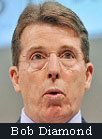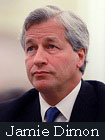Four years into the economic crisis, a Harris poll of U.S. adults in 2012 found that 70 percent believed “most people on Wall Street would be willing to break the law if they believed that they could make a lot of money and get away with itâ€. Despite efforts to regulate better behaviour in banking, there is ample evidence that little has changed.
The summer has seen one accusation after another suggesting banks still cannot be trusted, be it to adequately manage risk (JP Morgan Chase), to avoid money laundering by drug gangs (HSBC), to not violate sanctions against Iran (Standard Chartered), or to operate core banking activities without engaging in deceptive practices (Goldman Sachs) if not systemic corruption (Barclays).
The Economist in its reporting resurrected a 1929 Depression-era term that blends banker and gangster and called them all “Bankstersâ€.
The scandal involving Barclays—which has admitted to falsifying LIBOR rate information—was described in a Bloomberg editorial in July as “The worst banking scandal yet… a breath-taking portrait of avarice and deceitâ€.
As Bloomberg explained: “To hide their institutions’ problems during the financial crisis, or often to boost their traders’ profits, bankers knowingly submitted false data for the calculation of the London Interbank Offered Rate, a benchmark interest rate that influences the value of hundreds of trillions of dollars in financial contracts around the world, including floating-rate mortgages, corporate loans and interest-rate swaps.â€
Barclays is only the first to settle charges brought by the U.S. and U.K. regulatory authorities in the LIBOR rate-fixing scandal (Citigroup and Deutsche Bank are among as many as 20 other banks implicated).
The public perception at least is that little has been learned since the financial crisis and the taxpayer-bailed-out bankers are back to business as usual, where making a buck—or, rather, megabucks—takes precedence over ethics.
 Casual Dishonesty
Casual Dishonesty
Is there something about banking that attracts people who readily adopt a practice of “casual dishonesty†(as The Economist described the culture revealed by the LIBOR scandal)? If greed is at the root of the misconduct, historically at least banking has offered considerable opportunities for self-enrichment of spectacular proportions and generally by taking risks with other people’s money. Many also argue that the financial crisis revealed that these financial rewards were not commensurate to talent or effort and had to do more with recklessness rather than judicious risk-taking—if not dodgy practices.
Is regulation the answer? Bankers have claimed that proposed regulatory changes in light of the financial crisis are largely unnecessary, wouldn’t work, and would stifle the sector and prevent it fulfilling tasks essential to the economy. Leading the charge has been Bob Diamond, the disgraced former head of Barclays, and Jamie Dimon, chief executive of JP Morgan Chase, also discredited in light of the reported US$5.8 billion trading loss by its Chief Investment Office (CIO), which was not supposed to take risky positions (the current estimated loss is three times the amount revealed in the bank’s quarterly earnings statement and has yet to be definitively quantified). The loss is officially attributed to a London trader known as “the London whale†because of the size of the positions he took. Yet no matter who actually placed the trades, this loss not only reflects poor risk management and weak internal controls but could also reveal fraud if it can be established that trading losses were intentionally hidden, as has been alleged (and is subject to investigation by regulatory authorities).
Even though regulators are acting in response to the weak oversight, poor internal controls and the possible fraudulent conduct, the JP Morgan Chase loss casts new doubt on bankers’ claims that further regulation is unnecessary. Moreover, commentators on the JP Morgan Chase loss observe that the scale of the bank’s CIO trading was such that it almost unavoidably moved markets as it attempted to hedge the bank’s positions. At the very least, it seems, “too big to fail†has become “too big to manageâ€.
Bring ‘em into line
Solutions that will, if adequately implemented, bring bankers back into line include more effective regulation, stronger enforcement of regulations coupled with higher penalties (prison for corporate criminals as well as bigger fines for individuals and their firms), and if not breaking up the big banks then a separation of retail banking from investment banking (many propose a return to the days of Glass-Steagall, including Sandy Weill, who—as then-head of Citicorp—was instrumental in bringing it down in the first place). However, while regulation must be part of the solution, we also need more integrity in banking.
 This brings us to the question of culture: unethical banking cultures have been widely identified as at least partially responsible for the LIBOR scandal. This is another hypothesis rejected by JP Morgan Chase’s Jamie Dimon, along with the claim of inadequate regulation. Indeed, having recovered his composure following the multi-billion dollar trading loss under his watch, Dimon is once again outspoken in his latest response to banking’s critics.
This brings us to the question of culture: unethical banking cultures have been widely identified as at least partially responsible for the LIBOR scandal. This is another hypothesis rejected by JP Morgan Chase’s Jamie Dimon, along with the claim of inadequate regulation. Indeed, having recovered his composure following the multi-billion dollar trading loss under his watch, Dimon is once again outspoken in his latest response to banking’s critics.
In New York Magazine (“122 minutes with Jamie Dimonâ€, 12 August 2012) he is quoted as saying: “Everyone is talking about the culture, the culture, and all that, and it’s just not true… Most bankers are decent, honorable people. We’re wrapped up in all this crap right now. We made a mistake. We’re sorry. It doesn’t detract from all the good things we’ve done.†Of course many bankers are decent and honorable people, but the cumulative evidence today suggests that the banking scandals are not simply misconduct by a few bad apples; rather, there appears to be a systemic issue here. It is bad apples in bad barrels.
Fostering ethical organisational cultures—changing those barrels as well as getting rid of bad apples—is surely key to generating greater integrity in banking. This is not something that can be achieved overnight, but organisations and, perhaps, an entire sector can be changed.
Change starts with the tone from the top and it is noteworthy that the new chairman of Barclays, Sir David Walker, has been publicly welcomed as a critic in the past of compensation excesses in banking. However, integrity must permeate the entire organisation. Achieving this sort of change is comparable to how car manufacturers have instilled a commitment to quality or chemical companies such as DuPont have succeeded in making safety first such a central value. Often, external pressure, not least from regulators wielding big sticks, spurs recognition of the need to change.
The incubators
Finally, what about the role of business schools? Do they provide a training ground for this bad behaviour? Luigi Zingales, a professor on the finance faculty at the University of Chicago Booth School of Business, observed in a comment piece for Bloomberg (“Do business schools incubate criminals?â€, 17 July 2012), that “We are dealing with a drop in ethical standards throughout the business world, and our graduate schools are partly to blame.†He sees the banking scandals as the result of an “amoral culture that we—business-school professors—helped fosterâ€. He proposes that the solution should start in our classrooms, with ethics as an integral part of core MBA classes, something that happens only rarely today. While there are notable exceptions, in too few schools is there any real attention to integrity and the role of values in business. For all the promises of greater attention to business ethics, with the financial crisis seemingly over, it’s back to business as usual at B-School as well as at the banks.
 (N. Craig Smith is the INSEAD Chaired Professor of Ethics and Social Responsibility. This article is republished courtesy of INSEAD Knowledge http://knowledge.insead.edu. Copyright INSEAD 2012.)
(N. Craig Smith is the INSEAD Chaired Professor of Ethics and Social Responsibility. This article is republished courtesy of INSEAD Knowledge http://knowledge.insead.edu. Copyright INSEAD 2012.)







